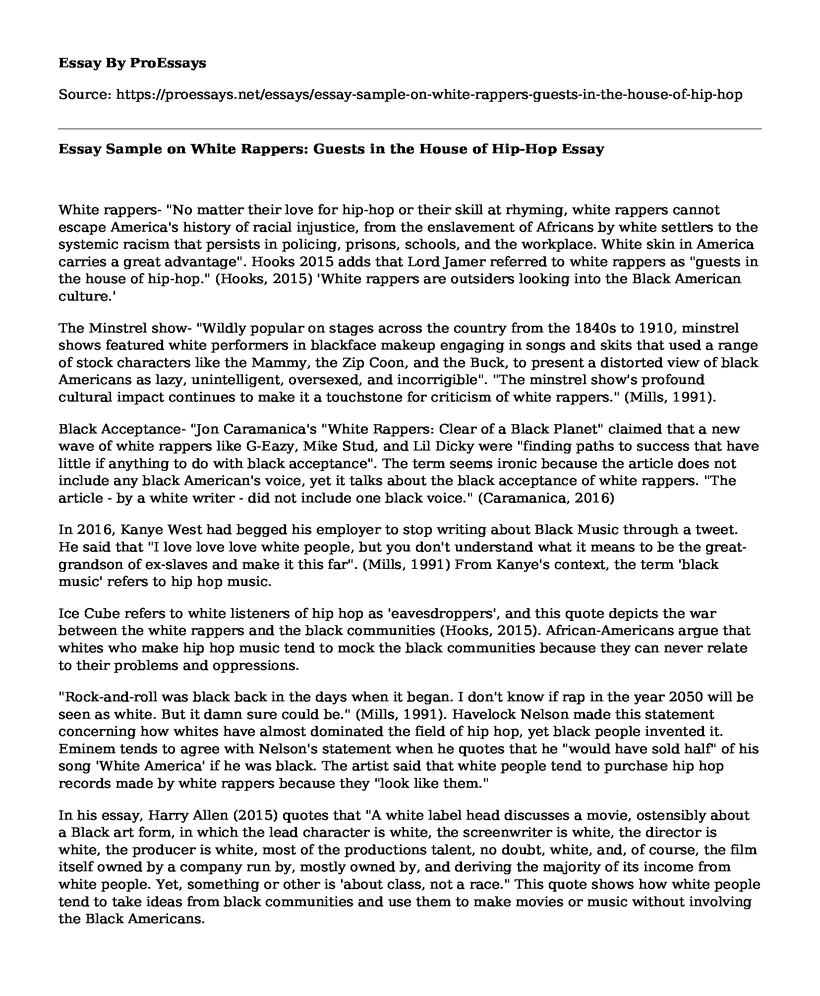White rappers- "No matter their love for hip-hop or their skill at rhyming, white rappers cannot escape America's history of racial injustice, from the enslavement of Africans by white settlers to the systemic racism that persists in policing, prisons, schools, and the workplace. White skin in America carries a great advantage". Hooks 2015 adds that Lord Jamer referred to white rappers as "guests in the house of hip-hop." (Hooks, 2015) 'White rappers are outsiders looking into the Black American culture.'
The Minstrel show- "Wildly popular on stages across the country from the 1840s to 1910, minstrel shows featured white performers in blackface makeup engaging in songs and skits that used a range of stock characters like the Mammy, the Zip Coon, and the Buck, to present a distorted view of black Americans as lazy, unintelligent, oversexed, and incorrigible". "The minstrel show's profound cultural impact continues to make it a touchstone for criticism of white rappers." (Mills, 1991).
Black Acceptance- "Jon Caramanica's "White Rappers: Clear of a Black Planet" claimed that a new wave of white rappers like G-Eazy, Mike Stud, and Lil Dicky were "finding paths to success that have little if anything to do with black acceptance". The term seems ironic because the article does not include any black American's voice, yet it talks about the black acceptance of white rappers. "The article - by a white writer - did not include one black voice." (Caramanica, 2016)
In 2016, Kanye West had begged his employer to stop writing about Black Music through a tweet. He said that "I love love love white people, but you don't understand what it means to be the great-grandson of ex-slaves and make it this far". (Mills, 1991) From Kanye's context, the term 'black music' refers to hip hop music.
Ice Cube refers to white listeners of hip hop as 'eavesdroppers', and this quote depicts the war between the white rappers and the black communities (Hooks, 2015). African-Americans argue that whites who make hip hop music tend to mock the black communities because they can never relate to their problems and oppressions.
"Rock-and-roll was black back in the days when it began. I don't know if rap in the year 2050 will be seen as white. But it damn sure could be." (Mills, 1991). Havelock Nelson made this statement concerning how whites have almost dominated the field of hip hop, yet black people invented it. Eminem tends to agree with Nelson's statement when he quotes that he "would have sold half" of his song 'White America' if he was black. The artist said that white people tend to purchase hip hop records made by white rappers because they "look like them."
In his essay, Harry Allen (2015) quotes that "A white label head discusses a movie, ostensibly about a Black art form, in which the lead character is white, the screenwriter is white, the director is white, the producer is white, most of the productions talent, no doubt, white, and, of course, the film itself owned by a company run by, mostly owned by, and deriving the majority of its income from white people. Yet, something or other is 'about class, not a race." This quote shows how white people tend to take ideas from black communities and use them to make movies or music without involving the Black Americans.
Have white rappers dominate the hip hop world?- "White rappers like Beastie Boys, Eminem and Mac Miller have earned accolades from their black contemporaries." (Hooks, 2015). The three are just a representation of the many whites who have successfully ventured in the field of hip hop. Rock-and-roll was black back in the days when it began. I don't know if rap in the year 2050 will be seen as white. But it damn sure could be" (Mills, 1991). Havelock Nelson fears are about the rate which white rappers have risen within the past few years.
Eminem, Post Malone, Paul Wall, Everlast, Lil Dicky, G-Eazy and Mac Miller. Those are just some of the white artists who have been making headlines in the hip hop industry. They rose to fame even with all the contradictions and rejection from the black community and have surpassed many black hip hop artists. Black Americans invented hip hop music as a way of expressing their oppression by the whites. White rappers do not relate to this concept because they did not suffer from any kind of oppression. However, they 'stole' the idea of hip hop music and are now making headlines. White rappers have not yet dominated the hip hop world, but they are headed there. They are slowly overtaking the hip hop industry, and as Havelock Nelson says, they might dominate the hip hop field by the year 2050.
Cite this page
Essay Sample on White Rappers: Guests in the House of Hip-Hop. (2023, Mar 24). Retrieved from https://proessays.net/essays/essay-sample-on-white-rappers-guests-in-the-house-of-hip-hop
If you are the original author of this essay and no longer wish to have it published on the ProEssays website, please click below to request its removal:
- Essay Sample on Nursing and Social Media Use at Work
- Research Paper on Brass Bands in New Orleans
- Essay Example on Visual Ethnography: Taking Photography to the Next Level
- Native Filmmakers: New Approaches to Cultural Criticism - Essay Sample
- Maersk Alabama: Hijacking, Action, and Drama on the High Seas - Paper Example
- Marriage Story - Free Movie Review Sample
- Essay Example: The Film Invictus Demonstrates the Power of National Pride and Unity







